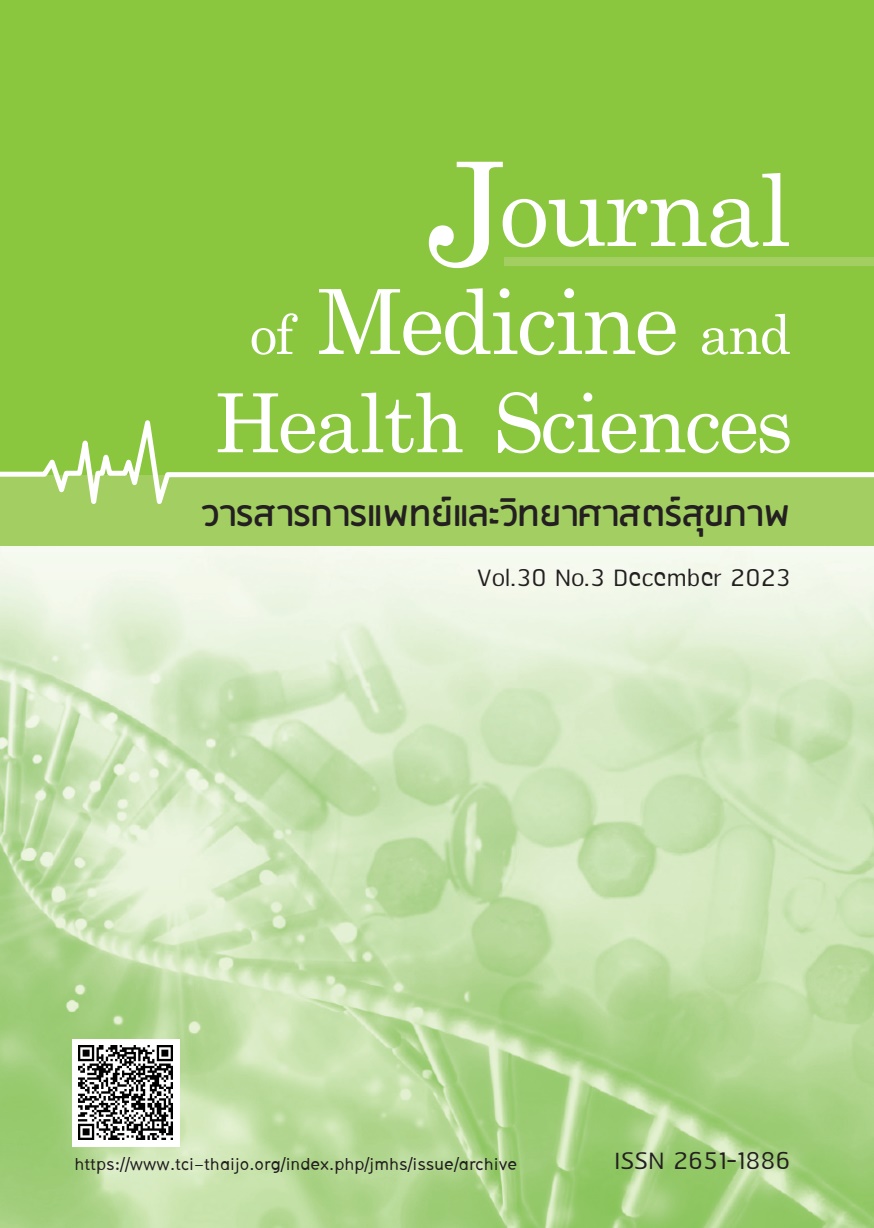Effects of a perceived self-efficacy, disease knowledge, and social support enhancement program on knowledge, self-care behaviors, and blood pressure among the older adults with uncontrolled hypertension
Keywords:
uncontrolled hypertension, perceived self-efficacy, disease knowledge, social support, self-care behaviorsAbstract
The issue of chronically ill elderly individuals, particularly those with often uncontrollable high blood pressure, is a significant public health concern in Thailand. This study aimed to explore the effect of a perceived self-efficacy, disease knowledge, and social support enhancement program on knowledge, self-care behaviors, and blood pressure in older individuals dealing with uncontrolled hypertension. Employing a quasi-experimental research design with a two-group pre-posttest approach, the sample included 60 elderly participants with uncontrollable high blood pressure from the Chronic Diseases Clinic at Banladchang Health Promoting Hospital in Nakhon Nayok province. Participants were assigned by simple randomization to either the experimental group (30 participants) or the control group (30 participants). The control group received routine health care services from physicians and nurses, while the experimental group, in addition to routine care, engaged in a 12-week program covering disease knowledge, medication management, label reading, nutrition awareness, information exchange, shared experiences with experienced older adults, exercise, stress management, problem-solving, goal-setting, and receiving educational video clips via the Line application. Assessments in knowledge, self-care behavior using questionnaires, and blood pressure measurement were conducted before the program, at 12 weeks, and at 16 weeks post-program. Data analysis involved Chi-square, Fisher’s exact test, t-test, and one-way repeated measure ANOVA. The results revealed (1) a statistically significant improvement in disease knowledge scores for the experimental group compared to the control group post-program (p<0.001). (2) at the 12th and 16th weeks, the experimental group demonstrated significantly higher self-care behavior scores than the control group (p=0.041, p=0.002 respectively). (3) at the 12th and 16th weeks, the experimental group exhibited statistically significant lower average systolic blood pressure compared to the control group (p=0.040, p=0.041 respectively). In conclusion, the study results indicate that the perceived self-efficacy, disease knowledge, and social support enhancement program could modify self-care behaviors, improve understanding of disease knowledge, and lower blood pressure in uncontrolled hypertension older adults.
References
World Health Organization. Hypertension report 2021 (cited in 2021, May 19). Available from https://www.who.int/news-room/fact-sheets/detail/hypertension.
Department of Disease Control. NonCommunicable Disease situational report: diabetes, hypertension and relating factors 2019 (Internet). Bangkok: Aksorn graphic and design publishing (cited in 2023, July 27). Available from http://www.thaincd.com/document/file/download/knowledge/NCDs63update.pdf. [in Thai]
Thai Hypertension Society. 2019 Thai guidelines on the treatment of hypertension (Internet). Chiang Mai: trickthink (cited in 2023, July 27). Available from http://www.thaihypertension.org/files/442.HT%20guideline%202019.with%20watermark.pdf.
Sinsap N, Jankra J. Hypertension in the elderly: Silence killer should be aware. JPNC 2017;28:100-11. [in Thai]
Thamnamsin K, Amnatsatsue K, Kerdmongkol P, et al. Effects of self-care promoting program on self-care behavior among older adults with uncontrolled hypertension in Bangkok metropolitan. J Public Health Nurs 2015;29:43-55. [in Thai]
Raji YR, Abiona T, Gureje O. Awareness of hypertension and its impact on blood pressure control among elderly Nigerians: report from The Ibadan study of aging. PAMJ 2017;27:190. [in Thai]
Panthonglang W, Namphonkrang P, Duangsanjan W. Factors Influencing the health behavior of uncontrolled hypertension patients. Songklanagarind J Nurs 2018;38:152-65. [in Thai]
Nawsuwan K, Singhasem P, Yimyearn Y, et al. Relationship and the predictive power of social support on the practice of hypertensive patients. BCNUT J Nurs 2016;8:1-12. [in Thai]
Tan FC, Oka P, Dambha-Miller H, et al. The association between self-efficacy and self-care in essential hypertension: A systematic review. BMC Fam Pract 2021;22:1-12.
Bandura A. Self-efficacy: Toward a unifying theory of behavioral change. Psychol Rev 1977;84:191-215.
Ranee S, Kepun A. Eating pattern in Muslim patients with coronary heart disease. J Nutr Assoc Thailand 2019;54:94-106. [in Thai]
Thatsaeng B, Lasuka D, Khampolsir T. Effects of a self-management supporting program on self-management behaviors and blood pressure. Nurs J 2012;39:129-39. [in Thai]
Srisatidnarakul B. The methodology in nursing research. 5th ed. Bangkok: U & I intermedia; 2010.
Polit DF, Beck CT. Nursing Research: Generating and assessing evidence for nursing practice. 10th ed. Philadelphia: Wolters Kluwer Health; 2017.
Intarasombat P, Sirapo-ngam Y, Chansirikarn S, et al. Effects of patients’ and families’ participation in health care on function outcomes, well-being, complications, length of stay in elderly patients and patients’ and family satisfaction with care. Rama Nurs J 1996;2:4-15. [in Thai]
Jitapunkul S. Principles of geriatric medicine. 3rd ed. Division of Geriatric Medicine. Faculty of Medicine, Chulalongkorn University. Bangkok.
Aroonsang P. Health assessment in adult and older adults for nurses. 2nd ed. Khonkhaen: Klunnana vitthaya press; 2013.
Onsrinoi N, Leelukkanaveera Y, Toonsiri C. Predictive factors of hypertension preventive behaviors among people with pre-hypertension. Songklanagarind J Nurs 2017;37:63-74. [in Thai]
Pender NJ, Murdaugh CL, Parsons MA. Health promotion in nursing practice. 6th ed. New Jersey: Pearson Education; 2011.
Mersal FA, Mersal MA. Effect of evidence-based lifestyle guideline on self-efficacy of patients with hypertension. Int J Curr Microbiol App Sci 2015;4:244-63.
Wankaew N, Burilert O, Cheusathuchon. The Effectiveness of Behavior Modification with 3 Self Health and Social Support on Health Behaviors of Hypertensive Patients, the 50 Pansa Mahavajiralongkorn Hospital. UBRU J Public Health Res 2019;8:98-110. [in Thai]
Boonyathee S, Seangpraw K, OngArtborirak P, et al. Effects of a social support family caregiver training program on changing blood pressure and lipid levels among elderly at risk of hypertension in a northern Thai community. PLoS ONE 2021;16:e0259697.
Foroumandi E, Kheirouri S, Alizadeh M. The potency of education programs for management of blood pressure through increasing self-efficacy of hypertensive patients: A systematic review and meta-analysis. Patient Educ Couns 2021;103:451-61.
Santiprasitkul S, Junlapeeya P. Effects of self-efficacy enhancement program on health outcomes of people living with hypertension residing in Chiang Rai province, Thailand. J Nur Healthcare 2017;35:100-9.
Downloads
Published
How to Cite
Issue
Section
License

This work is licensed under a Creative Commons Attribution-NonCommercial-NoDerivatives 4.0 International License.



